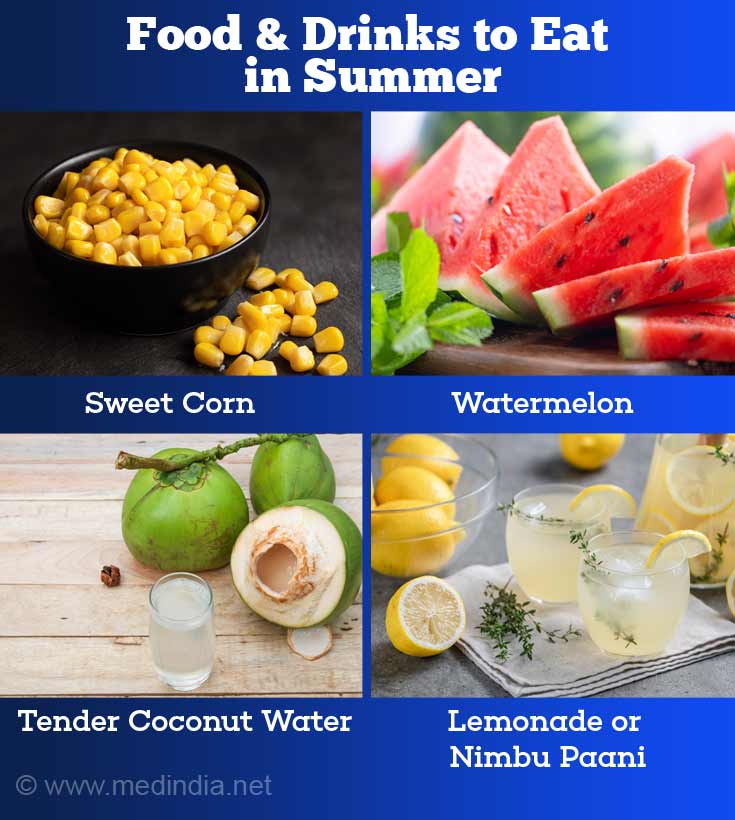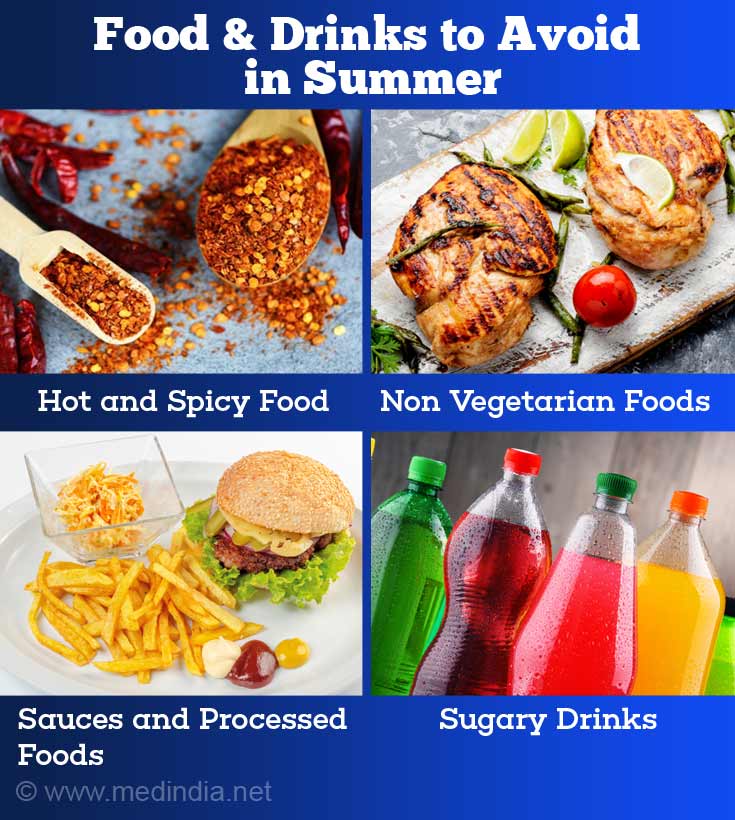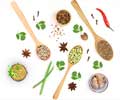- Staying Hydrated - Staying Healthy - (http://www.heart.org/heartorg/healthyliving/physicalactivity/fitnessbasics/staying-hydrated---staying-healthy_ucm_441180_article.jsp#.wrqhyoiuziu)
- CDC Highlights Summer Health and Safety Tips - (https://www.cdc.gov/media/pressrel/r030626.htm)
Stay Healthy in Summer
Summer season with its scorching heat calls for special attention to the human body, for many reasons. The summer season in India is from April to June and is the hottest time of the year with longer days and shorter nights. With the mercury reaching an all-time high, the sweltering heat and dry hot winds require that you make changes in your diet for your body to cope with the high temperatures.
Extreme temperatures and dry conditions cause a number of heat related health problems and staying fit in summer is everybody’s primary concern. The food and drink that you will be consuming during the summer are going to play a vital role to help you tide through the heat wave because even healthy people can succumb to heat-related health issues.
Summers are a time for mostly staying indoors, wearing light colored, loose cotton clothes, eating light and drinking loads of water. Being outdoors increases risk of dehydration, skin allergies and nutritional deficiencies. While drinking enough water is crucial, you must also eat the right foods to stay fit, cool and healthy in summer.
Excessive heat in the summer season is known to cause irritability, lack of concentration, physical exhaustion and sleep problems. Infants, elderly and people with chronic health problems are most at risk in the hot summer months.
Importance of Diet During Summer
In summer the risk of dehydration, indigestion, food poisoning and vitamin and mineral deficiencies increases. Hence go for food that is fresh, easily digestible and keeps your body cool. Eating seasonal fruits and vegetables offer us protection from the sun as they contain high amounts of water and nutrients. Junk food like pizzas, burgers are a big “NO” and are best avoided in summer. You must plan to eat frequent small portions of food instead of large portions as they will be difficult to digest and you may end up feeling feel lazy, heavy and bloated.
With summer comes extreme thirst. You should increase your fluid intake to prevent getting dehydrated. It is advisable to drink water frequently even when you are not thirsty. Alcohol and beverages that are caffeinated, carbonated or high in sugar level are best avoided.
Foods to Eat in Summer

Curd and Butter Milk -
They help you remain cool in the summer heat and are packed with calcium, protein and contain probiotics [beneficial bacteria] that keep your digestive system running smoothly. You can add a few fresh mint leaves, cumin powder and black salt to the buttermilk for an added zing.Gooseberry (Amla) -
It is a rich source of vitamin C and fiber. Studies show that it is a collagen booster, especially benefits heart and hair, and reverses the aging effects caused by strong sun rays. You can eat them raw, boiled or prepare amla juice by adding four fresh chopped amlas to a glass of water. Blend fresh gooseberry in a mixer, strain the liquid and add a tablespoon of honey and crushed ice for extra taste.Sweet Corn -
It is best to consume organically cultivated corn. Corn is a rich source of vitamin A, B, E, fiber and minerals. It contains lutein and zeaxanthin [found in leafy greens and deep orange or yellow colored foods] which help lower your risk of developing age related macular degeneration, which is a common cause of blindness in the elderly. You can grill, bake or boil the corn according to your liking. You can also steam the corn with other vegetables such as zucchini and bell peppers which go especially well with corn for a tasty vegetarian salad.Tender Coconut Water
- An ideal energy drink provided by Nature. It contains vitamins, minerals, calcium, potassium, magnesium in their natural form which replenishes the body with the nutrients lost due to sweating and dehydration.Fresh Summer Fruits
- Watermelon, musk melon, pears, papaya, plums, berries, apricots, cherries, mango, and oranges are found abundantly in the summer season. These fruits are chock- a- block with vitamins, minerals and fiber. They can be cut into small bites and eaten or consumed as juices and tasty fruit salads. Simply chop up a few fruits of your choice and sprinkle a little lemon juice on top to enhance the taste. The salads are best prepared fresh as they will lose their crunchiness if stored in refrigerator. You can also add finely chopped fruits of your choice to curd and sprinkle with cinnamon powder, basil seeds and dried fruits for a crunchy tasty dessert. Milkshakes prepared from mangoes and bananas are a favorite with children. You may also use coconut milk instead of dairy milk for variety in taste.Lemonade or Nimbu Paani
- It is the most common summer drink in India. Add the juice of one or two lemons to a glass of water and add a pinch of roasted cumin powder, mint paste and black salt to it for a salty taste. You can add sugar and black salt for sweet lemonade.Fresh Summer Vegetables
- These contain antioxidants which prevent cellular damage due to intense heat of the sun, vitamins and fiber which help improve heart health, lower cholesterol and prevent chronic diseases such as cancer. Tomatoes offer extra protection from the sun as they contain lycopene which prevents sunburn. Zucchini, cabbage, bell pepper, broccoli, cauliflower and cucumber are found in abundance during the summer months. Cucumber or tomato slices seasoned with some salt and pepper or mixed with other vegetables for a salad is a healthy way to cool off this summer. Toss it with olive oil, salt, pepper and a dash of lemon to enhance the taste.Dark, Leafy Greens -
You can fill up on fresh spinach, kale, turnip greens, drumstick greens and mustard greens in summer to protect skin from sun damage. They decrease sensitivity to UV light and mend flaky and dry skin, strengthening the skin's defence against the damaging rays of the sun.Iced Tea-
Tea is rich in flavonoids [a type of antioxidant] which make your bones, teeth and gums healthy. Freshly brewed tea has maximum health benefits. Boil a glass of water and add one teaspoon of tea leaves and let it simmer for ten minutes. Cool and add honey to taste. It is advisable to drink only one or two cups of iced tea daily as more quantity may result in sleep and stomach disturbances.Sprouts–
They are easy to digest and contain high levels of water and nutrients. They can be eaten alone or mixed in a salad or added to other vegetables. A water melon, pineapple, cucumber and sprout salad is a tasty way of beating the summer blues.Foods to Avoid in Summer










